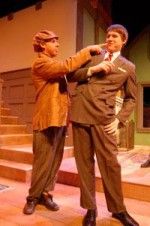Lady’s a Sure-Fire Hit

An adept university theater cast, under the direction of Visiting Assistant Professor of Theater Kate McConnell, performed Christopher Fry’s The Lady’s Not For Burning in Brehmer Theater daily from April 10 through 14. The play featured witty, intelligent and poetic dialogue that not only had the audience laughing, but also thinking. The actors delivered their lines, alternating between appropriate amounts of deadpan and emotion that evoked the absurd in a manner that entertained and provoked.
In fact, the audience laughed often and seemed quite engaged with the play, connecting with its humor. McConnell was especially satisfied with the audience the play received.
“The audience reactions have been enthusiastic,” McConnell said. “Everyone seems to find a different character or moment that sparks a connection for them. Overall, I couldn’t have been more pleased.”
The play takes place within one evening and begins with Thomas Mendip, played by senior Alexander Korman, arriving at the residence of mayor Hebble Tyson to ask to be hanged. The plot progresses with strange romantic complications for Alizon Eliot, who is betrothed to the mayor’s nephew Humphrey, pursued by his other nephew Nicholas, and ultimate falls in love with the mayor’s assistant and employee Richard. This plotline is a companion to Thomas Mendip’s quest for death, which is also complemented by accused witch Jennet Jouredemayne’s urgent need to exonerate herself from crimes of witchcraft for which she is scheduled to be burned. All of these plotlines come together in a dinner party hosted by the mayor’s sister Margaret whose dialogue is delivered in a humorously wooden fashion. The purpose of the dinner is for Jennet to confess her crimes and Thomas Mendip to refute his.
Written by Christopher Fry in 1948, The Lady’s Not For Burning often dealt playfully with the theme of death, an appropriate motif to tackle within the context of World War II’s aftermath. Perhaps because of this historical context, death is thrust into the viewer’s mind from the play’s beginning when Mendip first casually asks to die by hanging, presumably out of guilt over his stint in the Army. Upon being denied his request, Mendip becomes desperate to prove his guilt and implores the mayor for punishment.
Though the play approached serious themes like death, punishment and justice, it left an optimistic imprint on its audience. McConnell felt that Fry’s work presented a combination of themes that have contemporary pertinence.
“Fry’s play and his ideas still resonate strongly with today’s audiences,” McConnell said. “[Fry] is interested in poking fun at the fears and foibles of the world, while reminding us of the joy of possibility and particularly the redemptive power of love.”
McConnell’s view on the play’s relevancy was echoed by audience member junior Ashley Lazevnick.
“Since the setting was not readily clear, the viewer was able to concentrate on the themes of the play,” Lazevnick said. “The issues that arise throughout the play — the nature of justice, the agency of human action, the value of life — are still relevant for the viewer.”
In the end, the importance of love was one of the ideas impressed greatly upon the audience: Alizon Eliot and Richard run off together, as do Jennet Jouredemayne and Thomas Mendip. These couplings make for an obvious happy ending that would seem clichéd were it not for the beauty and lyricism of the dialogue, as well as the strength and talent of the acting.






